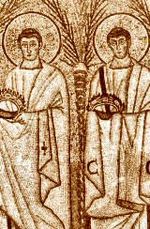Summary notes for use in conjunction with the 'How to Say the Office' series - page references are to the psalter section of the Farnborough Monastic Diurnal.
THE OFFICE FOR SATURDAY OF OUR LADY (CLASS IV SATURDAYS THROUGHOUT THE YEAR) (see below for Class III feasts and above)
Saturday Lauds
- Opening prayers and Psalm 66 as for Monday, MD 58-59;
- Then go to MD 133; use festal canticle (MD 138);
- Chapter, responsory, hymn, versicle and Benedictus antiphon for Our Lady from MD (130) for throughout the year, or as per the season;
- Benedictus from the card, or MD 73;
- Concluding prayers as for Monday, MD 75;
- Collect for Our Lady on Saturday (MD (131) or as per season), see Ordo; if there is a commemoration (memorial), the relevant texts are said immediately after the collect of the day.
Saturday Prime
• Opening prayer and hymn, MD 1-2;
• Antiphon (before and after psalms) for Our Lady on Saturday (MD (131) or for the season);
• Psalms MD 32-37;
• Chapter, versicle and concluding prayers MD 7-9.
Saturday Terce
• Opening prayer (Deus…) as per MD 1;
• Hymn Nunc Sancte MD 183;
• Starts MD 183 (opening prayer as per MD 1);
• Antiphon of Our Lady on Saturday (MD (132) or for the season);
• Psalms MD 184-186;
• Chapter and versicle of Our Lady on Saturday (MD (132) or season);
• Closing prayers as at MD 154 (from Kyrie);
• Collect of Office of Our Lady on Saturday.
Saturday Sext
• Opening prayer (Deus…) as per MD 1;
• Hymn Rector potens MD 190;
• Antiphon of Our Lady on Saturday (MD (132) or season);
• Psalms MD 191-193;
• Chapter and versicle of Our Lady on Saturday (MD (132) or season);
• Closing prayers as at MD 154 (from Kyrie);
• Collect of Our Lady on Saturday.
Saturday None
• Opening prayer (Deus…) as per MD 1;
• Hymn Rerum Deus, MD 196-7;
• Antiphon (said before and after psalms) of Our Lady on Saturday (MD (132) or as per season);
• Psalms MD 198-199;
• Chapter and versicle of Our Lady on Saturday (MD 132-133 or as per season);
• Closing prayers as at MD 154 (from Kyrie);
• Collect of Our Lady on Saturday.
I Vespers of Sunday (Saturday Vespers) – Evening prayer
Note: on some Sundays and feasts, the antiphons, psalms, chapter, hymn etc may be specific to the feast – see Ordo.
• Starts MD 249;
• Antiphon for the Magnificat (MD 209) is particular to the day, for the correct page number see the Ordo;
• Magnificat MD 209-210 or from card;
• Concluding prayers MD 210 (from Kyrie) or MD 255-256;
• Collect of the following Sunday (or feast), see Ordo.
Saturday (and every day) Compline (before sleeping)
• Starts MD 257;
• Choose the Marian antiphon to conclude according to the season (throughout the year it is Salve Regina, MD 268).
SATURDAY ON CLASS III OR ABOVE FEASTS
Saturday Lauds
Note: On some feasts, the festal psalms (under Sunday in the psalter) may be used – see Ordo.
• Opening prayers and Psalm 66 as for Monday, MD 58-59;
• Then go to MD 133; use festal (MD 138) canticle;
• Antiphons, chapter, responsory, hymn, versicle and Benedictus antiphon from MD (130) for the feast, Common, day or season, as per Ordo;
• Benedictus from the card, or MD 73;
• Concluding prayers as for Monday, MD 75;
• Collect of the feast, see Ordo; if there is a commemoration (memorial), the relevant texts are said immediately after the collect of the day.
Saturday Prime
• Opening prayer and hymn, MD 1-2;
• Antiphon of the season (MD 31), day, or feast (see Ordo);
• Psalms MD 32-37;
• Chapter, versicle and concluding prayers MD 7-9.
Saturday Terce
• Opening prayer (Deus…) as per MD 1;
• Hymn Nunc Sancte MD 183;
• Starts MD 183 (opening prayer as per MD 1);
• Select antiphon (said before and after psalms) for the season (MD 184), day or feast (see Ordo);
• Psalms MD 184-186;
• Chapter and versicle of season, MD 186ff, or feast (see Ordo);
• Closing prayers as at MD 154 (from Kyrie);
• Collect for the day (see Ordo).
Saturday Sext
• Opening prayer (Deus…) as per MD 1;
• Hymn Rector potens MD 190;
• Select antiphon for the season (MD 190-191), day or feast (see Ordo);
• Psalms MD 191-193;
• Chapter and versicle of season, MD 193ff, day or feast (see Ordo);
• Closing prayers as at MD 154 (from Kyrie);
• Collect for the day (see Ordo).
Saturday None
• Opening prayer (Deus…) as per MD 1;
• Hymn Rerum Deus, MD 196-7;
• Select antiphon (said before and after psalms) for the season (MD 197), day or feast (see Ordo);
• Psalms MD 198-199;
• Chapter and versicle of season (MD 200ff), day or feast (see Ordo);
• Closing prayers as at MD 154 (from Kyrie);
• Collect for the day.
I Vespers of Sunday (Saturday Vespers) – Evening prayer
Note: Feasts, the psalms may be specific to the feast – see Ordo.
• Starts MD 249;
• Antiphon for the Magnificat (MD 209) is particular to the day, for the correct page number see the Ordo;
• Magnificat MD 209-210 or from card;
• Concluding prayers MD 210 (from Kyrie) or MD 255-256;
• Collect of the following Sunday (or feast), see Ordo.
Saturday (and every day) Compline (before sleeping)
• Starts MD 257;
• Choose the Marian antiphon to conclude according to the season (throughout the year it is Salve Regina, MD 268)











